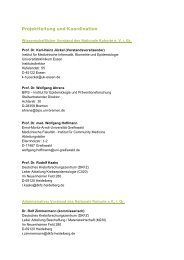Scientific Concept of the National Cohort (status ... - Nationale Kohorte
Scientific Concept of the National Cohort (status ... - Nationale Kohorte
Scientific Concept of the National Cohort (status ... - Nationale Kohorte
Create successful ePaper yourself
Turn your PDF publications into a flip-book with our unique Google optimized e-Paper software.
A.3<br />
A.3 Study design<br />
study. For example, PAXgene and Tempus tubes will be compared for quantitative RNA<br />
recovery and RNA quality. Both absolute cell recovery and representation <strong>of</strong> <strong>the</strong> various<br />
mononuclear cell fractions using Becton Dickinson 'CPT' tubes will be assessed in comparison<br />
to conventional Ficoll-Hypaque gradient centrifugation <strong>of</strong> ACD blood.<br />
Urine<br />
� Spot urine will be collected in 100-ml collection tubes (without additives). After centrifugation,<br />
<strong>the</strong> supernatant will be cooled in ice water, and aliquots will be prepared<br />
by using <strong>the</strong> liquid handling platform.<br />
� The pellet and five 10-ml aliquots will be stored separately; a final decision regarding<br />
this, however, is pending.<br />
Saliva<br />
� Saliva will be collected using SaliCap collection tubes (IBL International) with <strong>the</strong> aim<br />
<strong>of</strong> obtaining a final saliva volume <strong>of</strong> 2 ml. Two aliquots <strong>of</strong> saliva will be stored.<br />
Stool<br />
� Study participants will be provided with <strong>the</strong> stool collection tube (and supplemental<br />
material) beforehand, along with a description <strong>of</strong> how and when <strong>the</strong> stool sample will<br />
be selected and how <strong>the</strong> tube will be handled before transport to <strong>the</strong> study center (at<br />
visit). Each participant will be asked for one stool sample, at best from stool produced<br />
in <strong>the</strong> morning <strong>of</strong> <strong>the</strong> day <strong>of</strong> <strong>the</strong> study center visit. Two aliquots <strong>of</strong> stool will be stored.<br />
SOPs for collection and (minimum) processing <strong>of</strong> stool samples compatible with <strong>the</strong> constraints<br />
<strong>of</strong> field work in epidemiologic studies need to be definitively elaborated, and testing<br />
<strong>of</strong> sample quality necessary for high-throughput sequencing <strong>of</strong> microbial DNA and RNA will<br />
be conducted in <strong>the</strong> frame <strong>of</strong> a feasbility study.<br />
Nasal swabs<br />
� A trained study nurse will take a nasal swab using flocked nylon fiber sterile applicators<br />
(Copan Italia, Brescia, Italy). The tip <strong>of</strong> <strong>the</strong> swab will be frozen at <strong>the</strong> study center<br />
and shipped frozen to <strong>the</strong> central biobank, where it will be stored at –80 o C. The biobanked<br />
swabs will be analyzed with culture-independent methods only.<br />
Elaboration <strong>of</strong> SOPs for standardized collection, comparison between different types <strong>of</strong><br />
swabs regarding <strong>the</strong>ir ease <strong>of</strong> collection, and <strong>the</strong>ir use in microbial/virological studies will be<br />
tested in <strong>the</strong> feasibility study.<br />
A.3.5.4 <strong>Concept</strong> for transport, storage, and retrieval <strong>of</strong> biomaterials<br />
Transfer <strong>of</strong> biosamples to central and local storage centers<br />
Transportation will be required for <strong>the</strong> aliquots <strong>of</strong> serum, plasma, urine, blood, and <strong>the</strong> saliva,<br />
nasal swabs, and stool that are prepared ready-for-use in <strong>the</strong> local study centers. They<br />
will be transferred on dry ice to ei<strong>the</strong>r local or central storage facilities. The biomaterials to<br />
be processed in <strong>the</strong> central laboratory must be transferred at ambient temperature (viable<br />
cells) or at 4°C. Pr<strong>of</strong>essional transportation companies will be hired at defined intervals to<br />
transport <strong>the</strong> materials to <strong>the</strong> central and local biobanks.<br />
Overview <strong>of</strong> storage <strong>of</strong> biomaterials<br />
The collected biomaterials will be stored in three different ways:<br />
� Automated central biorepository at <strong>the</strong> helmholtz zentrum muenchen (hmGu)<br />
in Munich/Neuherberg (–80°C)<br />
120



